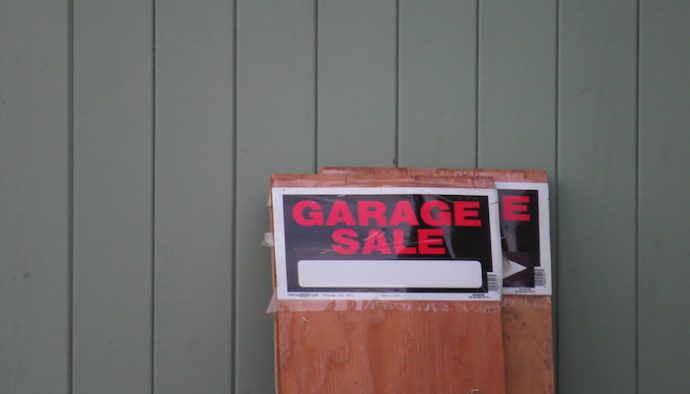God is generous with His children. Overwhelmingly so. Consider a couple of passages from Paul on the great giving nature of God:
“Praise the God and Father of our Lord Jesus Christ, who has blessed us in Christ with every spiritual blessing in the heavens” (Eph. 1:3). Paul goes on from there to consider some of these spiritual blessings in more detail, before praying that the eyes of the Ephesians would be opened ever wider to these blessings in Christ. And then there’s this:
“What then are we to say about these things? If God is for us, who is against us? He did not even spare His own Son but offered Him up for us all; how will He not also with Him grant us everything?” (Rom. 8:31-32). Of course that’s true. God did not spare Jesus Christ for us; it would be insane for us to think He is holding back anything else from us.
God is generous with His children. So how, then, can I title a blog post with the words “frugal” and “God” sitting next to each other? Well, it’s because frugality is not the opposite of generosity. Frugality is defined like this: “the quality of being frugal, or prudent in saving; the lack of wastefulness.” It’s that last part that has my eye this morning – that frugality is a refusal to waste anything. Or to put it another way, frugality is the conscious choice to make the very most of what you have at hand at a given moment.
This makes me think of my Nanny.
Nanny, who went to be with the Lord in the last year, was frugal. Intensely so. I think that’s because of her upbringing, because even into her eighties she could still tell stories of what it was like to be a little girl during the days of the Great Depression. She knew what a ration book was, and she bore witness to the lines for government assistance. She knew what it was to live without most things in her household and she never forgot. That’s why I have memories of her, from my own childhood, of visiting garage sales week after week and paying pennies for all different kinds of things. When Nanny moved from her lifelong home several years ago into an assisted living facility, her rooms still held many of these things she had picked up along the way. She was hesitant to throw anything away, not because she was a hoarder, but because she was frugal. She didn’t know when she might need something she already had, and she far preferred to get the maximum use out of what she had then spend money on something new.
And this makes me think of God in a way. For this same God who is so generous with His children is the same God who refuses to waste anything in our lives. Though we might not understand all the reasons why we are walking through this season or that, we can rest assured that whatever we are learning, in whatever way we are growing, and in whatever manner we are developing, God will use this later. He won’t throw it away. Such was the case with the people of Israel.
Consider with me what happened when it came time, after their deliverance from Egypt and when they were in the desert, for the people to build the tabernacle for God:
The Lord spoke to Moses: “Tell the Israelites to take an offering for Me. You are to take My offering from everyone who is willing to give. This is the offering you are to receive from them: gold, silver, and bronze; blue, purple, and scarlet yarn; fine linen and goat hair; ram skins dyed red and manatee skins; acacia wood; oil for the light; spices for the anointing oil and for the fragrant incense; and onyx along with other gemstones for mounting on the ephod and breastpiece. They are to make a sanctuary for Me so that I may dwell among them. You must make it according to all that I show you—the pattern of the tabernacle as well as the pattern of all its furnishings” (Exodus 25:1-9).
It’s important to note here that this was not a required offering; instead, God wanted these gifts to come from the willing because He has always loved a cheerful giver. No doubt the gifts would make for a beautiful and specific tabernacle for God. But there is one glaring question that ought to spring to mind, given the circumstances in which Moses received this word from the Lord:
Where would the people get all this stuff?
Let’s remember that until very recently, this group were slaves in the land of Egypt. They were numerous, but slaves nonetheless. What’s more, they had been slaves for multiple generations. And now they found themselves in the desert. It’s not the kind of people you would expect to be carrying around gold, silver, and bronze, much less fine and expensive yarn and skins. So even if the people had willing hearts, how could they possibly own the kinds of materials God was requiring for this offering? The answer, of course, is that God provides what God demands.
Back before the deliverance, before their exodus from Egypt and slavery, God told the people that not only would He deliver them, but that He would deliver them in such a way that they would be able to actually ask their former masters for all kinds of expensive things on the way out their land. And those same Egyptians who had been their cruel taskmasters would give them these things. And that’s how it happened:
“The Israelites acted on Moses’ word and asked the Egyptians for silver and gold jewelry and for clothing. And the Lord gave the people such favor in the Egyptians’ sight that they gave them what they requested. In this way they plundered the Egyptians” (Exodus 12:35-36).
That means these slaves marched through the desert with quite a haul. Problem was, though, that they didn’t have anything to do with these new found riches. Not living the life of nomads. Not in the desert. It wasn’t like there was a Dollar General over the next sand dune where they could plunk down some spices in exchange for a Mountain Dew. No, the people accumulated these things, and then they had to carry them. And I’m sure, given their penchant for complaining, that there was more than one Israelite that considered lightening their load and dumping some of their seemingly useless plunder along the way.
But God is wonderfully frugal. He knew His purposes, and He knew that even though the people could not yet see the purpose of the extra weight they were carrying, that eventually He would take these things and fashion something beautiful and glorifying to Himself. That is incredibly encouraging to me, and maybe you as well.
Perhaps you find yourself today accumulating something through a circumstance. Maybe you aren’t satisfied in your work, you don’t feel like any opportunities are coming your way, and you are hard pressed to find the purpose or reward in living faithfully right where God has you. Be encouraged – God is wonderfully frugal. You might not understand why you have to carry these things now, but there will come a day when what seems like weight will turn into an offering for the glory of God.
Subscribe to MichaelKelley.co
Never miss a new post. Subscribe to receive these posts in your inbox and to receive information about new discipleship resources.





